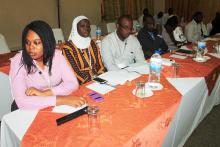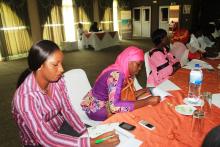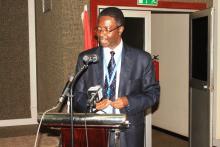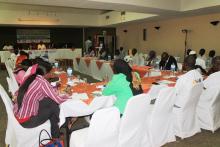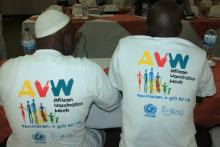The Gambia observes African Vaccination Week 2015
Banjul, The Gambia, 1st September 2015 - The African Vaccination Week (AVW), which is traditionally observed during the last week of April every year, was officially launched in the Gambia at the Atlantic Hotel in Banjul on Wednesday 28th July 2015. The event, which was a joint effort of the Ministry of Health and Social Welfare, the World Health Organization (WHO), United Nations Children Fund (UNICEF) and other partners, was launched by the Honourable Minister of Health and Social Welfare, Hon. Alhaji Omar Sey. The theme for this year 2015 is, “Closing the immunization Gap”.
In his statement at the launch, the Hon. Minister described the purpose of the event as a global initiative aimed at promoting the use of vaccines in order to protect people of all ages against diseases. He said that World Immunization Week 2015 as it is now called, also signals a renewed global, regional, and national effort to accelerate action to increase awareness and demand for immunization by communities, and improve vaccination delivery services. “The event is an integral part of a global framework endorsed by the World Health Assembly in May 2012 to prevent millions of deaths by 2020 through universal access to vaccines for people in all communities, and this is therefore everybody’s need and right (in particular women and children) to be protected from vaccine preventable diseases”, Hon Minister reiterated.
He stated that this year’s celebration focuses on closing the immunization gap and reaching equity in immunization levels as outlined in the Global Vaccine Action Plan (GVAP) which aims to strengthen routine immunization to meet vaccination coverage targets; accelerate control of vaccine-preventable diseases with polio eradication as the first milestone; introduce new and improved vaccines; and Spur research and development for the next generation of vaccines and technologies.
Minister Sey also noted that closing the immunization gap is all about families knowing where and when to go for immunization, ensuring there are enough health workers, with strengthened immunization services to help sustain the gains already made as well as reaching children of vulnerable populations who are not yet vaccinated.
He reiterated Government’s commitment to strengthening the health system in general and improving immunization services in particular. This, according to the Hon. Minister, is reflected in Government’s policy of ensuring that maternal and child health services are given free of charge as well as making immunization more accessible by ensuring that no mother has to travel more than 7 kilometers for these services. He said that the creation of a health promotion directorate charged with the responsibility of increasing awareness levels on every aspect of health care delivery in the country, gives further boost to Goverment’s efforts in ensuring that the public is aware of the benefits of immunization. He paid tribute to the Gambia being one of the first countries to be declared polio free by the Regional Certification Committee and commended his Ministry and partners for all the achievements registered in immunization services since the inception of the EPI programme in 1979.
He finally thanked WHO, UNICEF, GAVI and other partners for supporting their efforts.
For his part, the WHO Representative Dr. Charles Sagoe-Moses delivered a joint statement issued by WHO and UNICEF on behalf of the United Nations System in The Gambia. Dr. Sagoe-Moses described immunization as one of the most successful and cost-effective public health interventions, which prevents between 2 and 3 million deaths every year and protects children not only against diseases for which vaccines have been available for many years, such as diphtheria, tetanus, polio and measles, but also against diseases such as pneumonia and rotavirus diarrhea, 2 of the biggest killers of children under five.
He noted that adolescents and adults are equally protected against life-threatening diseases such as influenza, meningitis, and cancers (cervical and liver), thanks to new and sophisticated vaccines.
Despite these benefits and achievements, he noted that more work needs to be done to bridge the gap in immunization services as evidence shows that 1 in 5 children is still missing out. He noted that in 2013, an estimated 21.8 million infants did not receive lifesaving vaccines which may be attributed to different factors namely inadequate supply of vaccines, lack of access to health services, shortage of accurate information about immunization and insufficient political and financial support and can be the major barriers to accessing immunization services globally.
He said that this phenomenon is not uncommon in the Gambia, citing the Gambia’s 2013 DHS results which showed about 10% of children aged less than one year not receiving the third dose of Pentavalent Vaccine. This, according to Dr. Sagoe-Moses, means that there is still significant number of children not receiving basic vaccinations, justifying the need to do more to bridge the immunization gap.
He also informed the gathering that as we enter the final thousand days until the deadline to reach the Millennium Development Goals, equity has emerged as a critical theme for future global public health efforts as The Global Vaccine Action Plan, endorsed by the World Health Assembly, seeks to ensure that the benefits of immunization are equitably extended to all people regardless of geographic location, age, gender, disability, educational level, socioeconomic level, or ethnicity.
“Despite successes in improving access to immunization, inequities still exist, both between and within countries. Household wealth, geographic location and gender-related factors, such as the mother’s education, all have an impact on whether a child is immunized or not”, he noted.
He said that the United Nations System recognizes and lauds the Gambia’s widely-acknowledged track records in immunization services, but to consolidate and sustain these gains it will be recommended that greater attention be given to the implementation of the RED (Reaching Every District) strategy to help reach each and every child irrespective of age, gender, location and status with the aim of achieving 90% and 80% immunization coverage rates nationally and regionally.
In conclusion, Dr. Sagoe-Moses conveyed the United Nations System’s appreciation of Government’s support to the national immunization programme, and in particular, for fulfilling its obligations in meeting the cost of its traditional vaccines, injection material and co-financing obligations with GAVI for all the new vaccines introduced during the past four years.
He also commended the commitment and efforts of the Honorable Minister of Health and Social Welfare and his team in ensuring that the Gambia remains one of the champions of immunization which we are all proud of. He reassured the Hon. Minister of the United Nations System’s, through UNICEF and WHO, continued support to these efforts as well as ensuring the delivery of quality immunization services in The Gambia.
Mr. Dawda Sowe, National Manager - Expanded Programme on Immunization (EPI) gave a short presentation on the EPI programme, highlighting some of the key achievements and challenges registered in the delivery of immunization services.
He thanked the Global Alliance for Vaccine and Immunization (GAVI), the UN Systems and partners, and the MOH&SW particularly Health workers without whose interventions would not have recorded successes in the immunization programme in The Gambia.
In attendance were senior officials of the Ministry of Health, UN officials and a host of other partners as well as the media. Mr. Modou Njai, Director of Health Promotion and Education gave the vote of thanks. This event was preceded by a series of regional sensitization and community engagement to increase awareness on the importance of immunization
The acting Permanent Secretary in the Ministry of Health and Social Welfare, Mr. Dawda Ceesay, chaired by the ceremony.
____________________________________
For more information, please contact:
Mr. Momodou Gassama, Health Promotion Officer, gassamam [at] gm.afro.who.int, (+220) 4462286
Mr. George. Williams, Health Information Assistant, williamsg [at] gm.afro.who.int,(+220) 4462284




